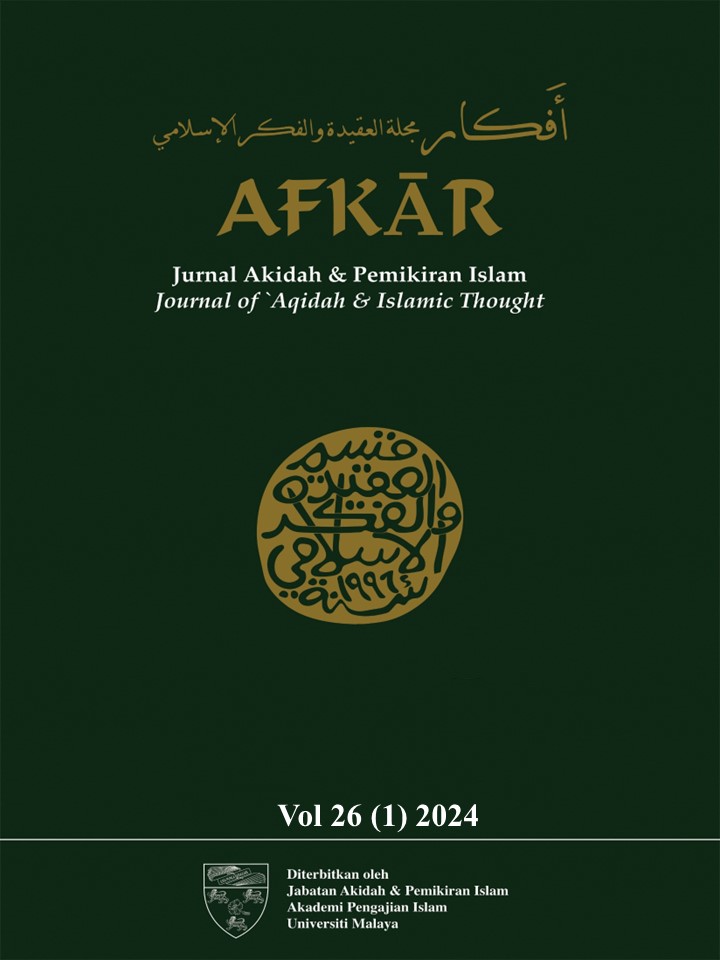Searching for Islamic Perspectives on Livelihood Theory: Insights from Al-Ghazali and Al-Shaybani
DOI:
https://doi.org/10.22452/afkar.vol26no1.7Keywords:
Al-Ghazali, Al-Shaybani, livelihood, theory, retrospectiveAbstract
The main purpose of this study is to explore livelihood theory in the works of al-Ghazali and al-Shaybani, presenting it as an alternative to mainstream livelihood conceptions by highlighting its normative impacts on current socio-economic situations. Through textual evidence, this study demonstrates that both scholars viewed livelihood not merely as a means to income and consumption, a perspective that fails to grasp the importance of livelihood as an end in itself and as a means to well-being. Al-Ghazali and al-Shaybani emphasized that livelihood involves affiliating individuals with social responsibilities, which encompass multidimensional variables (religious, legal, moral, political, social, economic, etc.) that influence each other. In light of this, the study proposes to evaluate the potential impact of their ideas on the latest theoretical developments in livelihood and economic science.
Downloads
References
Applebaum, H. A. The Concept of Work: Ancient, Medieval and Modern. New York: SUNY Press, 1992.
Arshad, M. N. M. “Market Failure: Notes on Teaching Microeconomics with Islamic Perspective.” International Journal of Economics, Management and Accounting 23(2) (2015): 263-270.
Braun, et al. “Using Thematic Analysis in Psychology,” Qualitative Research in Psychology 3(2) (2006): 77-101.
Briefs, Goetz. “Grenzmoral in der pluralistischen Gesellschaft.” In Wirtschaftsfragen der freien Welt, eds. Erwin von Beckerath, Fritz W. Meyer & Alfred Müller-Armack. Frankfurt am Main: Knapp, 1957.
Chambers, R. & G. R. Conway. Sustainable Rural Livelihoods: Practical Concepts for the 21st Century. Brighton: Institute of Development Studies, 1991.
Dusuki, Asyraf Wajdi & Bouheraoua, Said. “The Framework of Maqasid al-Shari’ah and Its Implication for Islamic Finance.” ICR Journal 2(2) (2011): 316-336.
Edgeworth, F. Y. Mathematical Psychics: An Essay on the Application of Mathematics to the Moral Sciences. New York: Augustus M. Kelley, 1967.
Ellis, Frank. Rural Livelihoods and Diversity in Developing Countries. UK: Oxford University Press, 2003.
Ellis, Frank. “Household Strategies and Rural Livelihood Diversification.” The Journal of Development Studies 35(1) (1998): 1–38.
Friedman, Milton. “The Methodology of Positive Economics.” In Essays in Positive Economics. Chicago: Chicago University Press, 1953: 3–34.
Gamst, F. C. Meanings of Work: Considerations for the Twenty-first Century. New York: SUNY Press, 1995
Al-Bukhari, Muhammad bin Isma‘il. Sahih al-Bukhari. Beirut: Dar al-Fikr, 1981.
Al-Ghazali, Abu Hamid. “Al-Risalah al-Laduniyyah: Part II,” trans. Margaret Smith, Journal of the Royal Asiatic Society (1938): 353-359.
Al-Ghazali, Abu Hamid. The Alchemy of Happiness. London: The Octagon Press, 1980.
Al-Ghazali, Abu Hamid. Ihya’ ‘Ulum al-Din, vol. I-V. Beirut: Dar al-Maa’rif, n.d.
Al-Ghazali, Abu Hamid. Jawahir al-Qur’an. Beirut: Dar al Ihya, 1986.
Ghazanfar, S. M & Islahi, Abdul Azim. “Economic Thought of an Arab Scholastic: Abu Hamid Al-Ghazali”, History of Political Economy 22(2) (1990): 1-403.
Al-‘Id, Ibn Daqiq. Sharh al-Ilmam bi Ahadith al-Ahkam. Damascus: Dar al-Nawadir, 2009.
Johnston, B. F. & J. W. Mellor. “The Role of Agriculture in Economic Development.” American Economic Review 51 (1961): 566-593.
Leshem, Dotan. “Retrospectives: What Did the Ancient Greeks Mean by Oikonomia?” Journal of Economic Perspectives 30(1) (2016): 225-231.
Orman, Sabri. “Al-Ghazali on Justice and Social Justice.” Tujise 5(2) (2018): 1-68.
Pigou, A. The Economics of Welfare. London: Macmillan & Co., London, 1932.
Possumah, B. T., Ismail, A. G., & Shahimi, S. “Bringing Work Back in Islamic Ethics.” Journal of Business Ethics 112(2) (2013): 257–270.
Rafael, M., Chiaravalloti, et al. “Sustainability of Social–Ecological Systems: The Difference Between Social Rules and Management Rules.” Conservation Letters 14(5) (2021), doi: 10.1111/CONL.12826
Rahman, F. “Riba and Interest.” Islamic Studies 3(1) (1964): 1-43.
Rostow, W. W. “The Stages of Economic Growth.” Economic History Review 12 (1959): 1-16
Robbins, Lionel. Essay on the Nature and Significance of Economic Science, 3rd ed. London: The Macmillan Press Ltd., 1935.
Saragih, Sebastian, Jonathan, Lassa & Afan, Ramli. Kerangka Penghidupan Berkelanjutan. Jakarta: Hivos Southeast Asia Office, 2007.
Sen, Amartya K. “Capability and Wellbeing.” In The Quality of Life, eds. Martha C. Nussbaum & Amartya K. Sen. Oxford: Clarendon Press, 1993: 30–53.
Smith, Adam. The Wealth of Nations. Harmondsworth: Penguin, 1974.
Al-Shatibi, Abu Ishaq Ibrahim bin Musa. Al-Muwafaqat fi Usul al-Shari‘ah, vol. 2. Beirut: Dar al-Kutub al-‘Ilmiyyah, 2003.
Al-Shaybani, Muhammad ibn al-Hasan. “Al-Kasb”. In Min Kutub al-Iqtisadi al-Islami, ed. ‘Abd al-Fattah Abu Ghuddah. Syria: Maktab al-Matbu‘at al-Islamiyyah, 1997.
Tara, Nair. Understanding Livelihoods: A Review of Major Debates, State of India’s Livelihoods Report 2012. Sage Publications, 2012.
Usman, Abur Hamdi, et al. “The Concept of an Ideal Society: A Review of Fazlur Rahman’s Perspective.” International Journal of Islamic Thought 21 (2022): 1-12.
Downloads
Published
How to Cite
Issue
Section
License

This work is licensed under a Creative Commons Attribution-NonCommercial 4.0 International License.









